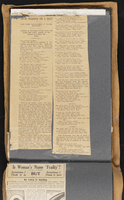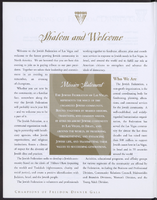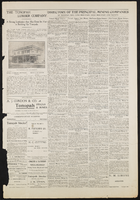Search the Special Collections and Archives Portal
Search Results
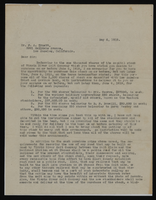
Correspondence, Thomas Toland to F.A. Truett
Date
Archival Collection
Description
Text
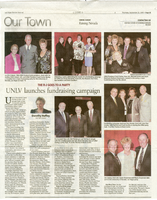
"UNLV launches fundraising campaign" Las Vegas Review-Journal article
Date
Archival Collection
Description
September 22, 2005 tear sheet from the Las Vegas review-Journal covering a UNLV capital campaign event. Jon Eric Cobain and his mother Ruth Cobain are pictured in the top left photo.
Mixed Content
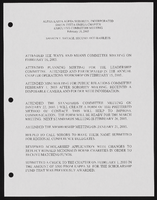
Alpha Kappa Alpha Sorority, Theta Theta Omega Chapter executive committee reports
Date
Archival Collection
Description
From the Alpha Kappa Alpha Sorority, Incorporated, Theta Theta Omega Chapter Records (MS-01014) -- Chapter records file.
Text

Don Perry interview, March 05, 1978: transcript
Date
Archival Collection
Description
On March 5th, 1978, Karen Croteau interviewed Don Perry (b. 1928 in Clarksburg, West Virginia) about Paiute Indians and life on a reservation. Perry begins by mentioning his own Indian heritage with a Cherokee mother and his wife’s Paiute heritage. Perry focuses on his conversations with his wife’s grandmother, who lived on the Paiute reservation since birth, from who he learned about the reservations history. He particularly delves into the traditions of Indian burials, governing on the reservation, and the difference between an Indian reservation and an Indian colony. Additionally, he talks about recreation on the reservations, education of Paiute Indians, and how reservations have changed. Throughout the interview, Perry gives personal anecdotes about his life in connection to the Paiute people and his experiences with their traditions and belief systems. Perry ends by discussing governing politics of the Paiute reservation and the start of Las Vegas as a gambling town.
Text

Transcript of interview with Mae Farei by Martha Jane Cunningham, February 24, 1980
Date
Archival Collection
Description
On February 24, 1980, Martha Cunningham interviewed her aunt, Mae Farei (born 1909 in Illinois), about her experiences living in Nevada. Farei first talks about the development of the Downtown and Strip areas. She then discusses work at the Twin Lakes Lodge and Stardust as a housekeeper, and she later mentions some of the recreational activities available to those in Nevada. She also mentions the importance of Nellis Air Force Base and expresses her appreciation for living in Southern Nevada.
Text
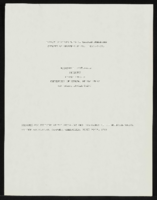
"Impact of Stereotypes of Mexican Americans Created by Selected Films: 1920s-1960s" paper by Roosevelt Fitzgerald
Date
Archival Collection
Description
From the Roosevelt Fitzgerald Professional Papers (MS-01082) -- Unpublished manuscripts file. Presented at the Social Science Conference of the National Social Science Association, Newport Beach, California.
Text
Wilbur and Toni Clark Papers
Identifier
Abstract
The Wilbur and Toni Clark Papers date from 1944 to 1991, with the bulk from 1953 to 1963 and document the lives of Wilbur and Toni Clark in Las Vegas, Nevada and the development of the Desert Inn Hotel and Casino. The collection includes correspondence from Wilbur Clark to those he identified as important individuals including government officials and celebrities. It also includes materials related to Clark’s plan of building luxury apartments near the Desert Inn, and newspaper clippings and scrapbooks about the Clarks and the Desert Inn. The collection contains some audiovisual materials including Wilbur and Toni Clark's home movies, news footage, and film footage of Las Vegas, Nevada and the Desert Inn.
Archival Collection

